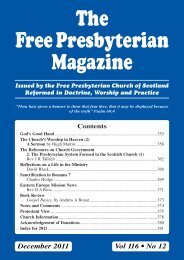March - the Free Presbyterian church of Scotland
March - the Free Presbyterian church of Scotland
March - the Free Presbyterian church of Scotland
You also want an ePaper? Increase the reach of your titles
YUMPU automatically turns print PDFs into web optimized ePapers that Google loves.
82The <strong>Free</strong> <strong>Presbyterian</strong> Magazine<strong>the</strong> discovery <strong>of</strong> a historical fact, however important; <strong>the</strong>re was stirred up inDaniel <strong>the</strong> exercise <strong>of</strong> a broken and contrite heart, for <strong>the</strong> captivity had arisenas a result <strong>of</strong> Israel’s sin. It also stirred up <strong>the</strong> faith which lays hold on <strong>the</strong>promises, and by which <strong>the</strong> believer wrestles at a throne <strong>of</strong> grace.His meditation led to his prayer <strong>of</strong> confession and supplication, recordedalso in Daniel 9. The priests went about <strong>the</strong>ir work in <strong>the</strong> Holy Place in anatmosphere <strong>of</strong> incense, and all our preparations to preach ought to be characterisedby a spirit <strong>of</strong> prayer. We need <strong>the</strong> help <strong>of</strong> God at every juncture.Doddridge wrote, “The better we pray, <strong>the</strong> better we study”. When seekinga suitable text we ought to invoke <strong>the</strong> help <strong>of</strong> God, whose Word it is, and toseek His Spirit, so that <strong>the</strong> whole exercise would be to God’s glory and <strong>the</strong>salvation <strong>of</strong> ourselves and our hearers. In preparing a sermon, Cotton Ma<strong>the</strong>r’scustom was to stop at each paragraph and seek by prayer to be impressed by<strong>the</strong> spiritual truths contained in it. John was in <strong>the</strong> Spirit on <strong>the</strong> Lord’s day,and we ought to pray that <strong>the</strong> same Spirit would honour us with His presence,so that we might be in <strong>the</strong> Spirit while in <strong>the</strong> Lord’s work, that <strong>the</strong> fear <strong>of</strong>man would be taken away and a love for souls brea<strong>the</strong>d into our hearts.The preacher is, as Richard Baxter says, but a dying man speaking todying men. How can we speak “as <strong>the</strong> oracles <strong>of</strong> God” unless <strong>the</strong> Spirit issent down from heaven to give divine authority and weight to <strong>the</strong> Word? Wehave every encouragement to seek that Spirit: “If ye <strong>the</strong>n, being evil, knowhow to give good gifts unto your children, how much more shall your Fa<strong>the</strong>rwhich is in heaven give good things to <strong>the</strong>m that ask Him?” (Matt 7:11). OurFa<strong>the</strong>r in heaven has an infinitely greater concern for His children and Hischildren’s good than we have for our own <strong>of</strong>fspring. William Gurnall says,“There must be <strong>the</strong> labour <strong>of</strong> study before ministers preach, <strong>the</strong> labour <strong>of</strong> zealand love in preaching, <strong>the</strong> labour <strong>of</strong> suffering after preaching, and always <strong>the</strong>labour <strong>of</strong> prayer to crown <strong>the</strong> whole with success”. As <strong>the</strong> Lord went up into<strong>the</strong> mountain to pray after addressing <strong>the</strong> multitude (Mk 6:34-46), so mustwe pray earnestly after preaching for a blessing on <strong>the</strong> word spoken. Bridgesnotes this prayer after <strong>the</strong> sermon as part <strong>of</strong> pulpit preparation.If a sinful Jacob prevailed with God, much more must a perfectly holy Jesus,presenting nothing to God but what is becoming <strong>the</strong> purity and mercifulness <strong>of</strong> Hisown nature to grant. If His blood were “without blemish”, His intercession must bewithout spot, because <strong>the</strong> one is <strong>the</strong> sole foundation <strong>of</strong> <strong>the</strong> o<strong>the</strong>r.What <strong>the</strong>re was <strong>of</strong> humility and supplication in [Christ’s] prayers upon earth proceededfrom His human nature; what <strong>the</strong>re was <strong>of</strong> authority and efficacy in His mediatoryinterpositions proceeded from His divine nature. He was bound to die as He wasman, taking upon Him our sins; He had a right to have His death accepted as Hewas God, assuming and sustaining our nature.Stephen Charnock
















